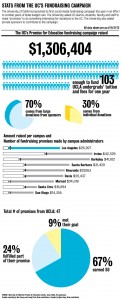The University of California’s first social media fundraising campaign ended Thursday with a total of more than $1.3 million in donations and mixed reactions from participants.
The UC campaign, called “Promise for Education,” raised money for need-based grants and scholarships for undergraduate students from California.The campaign was an effort to make up for budget cuts over the last five years.
Individuals involved with the campaign promised to do certain tasks, such as hosting a party or piercing their eyebrow, if their fundraising goals were met.
The goal of the campaign was not only to raise money, but also to inform the public of how important student scholarships are to the UC, said Jason Simon, director of marketing communications for the UC.
Members of the UCLA community specifically raised about $27,000 for the campaign. UC Berkeley and UC Irvine were the top fundraising campuses in the campaign, raising more than $40,000 each, while UC San Diego raised the least at less than $15,000.

He added that the UC will take 10 percent of each contribution to help cover for administrative costs involved with managing the gift funds.
Though the UC system as a whole raised more than $1.3 million, most of the money came from sponsors such as Bank of America and the Entertainment Industry Foundation rather than members of the UC community. Individuals raised more than $400,000 over six weeks.
“Initially … we had some large private gifts from corporate sponsors, the rest has been … sort of a slow trickle in,” Simon said.
Individuals made more than a thousand promises and 3,000 contributions to the campaign, but the majority of promises raised little or no money.
Out of 44 promises made for UCLA, only four promises reached their fundraising goal, while about two-thirds of promises raised no money. The trend prevailed systemwide as well, with only 15 percent of promises reaching their goals.
Judith Smith, a former UCLA dean and professor emerita, who promised to record herself singing part of an opera if she reached her fundraising goal, said if the campaign was meant to be a significant source of revenue, it should have been “shorter and punchier.”
Smith suggested that future campaigns set a total fundraising goal to get more donations.
John Joanino, Undergraduate Students Association Council president, expressed appreciation for the campaign’s cause but had reservations about the UC Office of the President’s expectations. Joanino fell $250 short of his fundraising goal.
“Resources are scarce,” Joanino said, “It’s a lot to ask for when we are already trying to find funding for our other (fundraising) campaigns.”
Some students and alumni who participated in the campaign, however, said they see the campaign as a positive first step toward increasing funding for undergraduate scholarships.
Angela Sanchez, a student at the UCLA Graduate School of Education and Information Studies, made the promise of holding a 24-hour magic marathon. She raised about a quarter of her $3,000 goal.
She said she thinks the campaign serves to help students in need of scholarships, like she was when she and her father found themselves homeless during her last two years of high school.
“(The) Promise for Education campaign … is the fastest way to help (students),” Sanchez said. “Students can feel less financial strain. … This is what we can do to alleviate the pressure (on students).”
The UC also reached out to celebrities, politicians and administrators in an effort to make the campaign promises go viral. For instance, Bryan Cranston, who played Walter White in the television series “Breaking Bad,” promised to leave a personal voice message for those who donated more than $100 to his campaign.
UCLA Chancellor Gene Block, the only administrator from UCLA who participated, promised a party at his home for anyone who donated more than $250 to his promise. Block raised roughly 40 percent of the money made by UCLA in the campaign.
Simon said the UC will evaluate the results of the Promise for Education campaign when determining if it will launch another similar initiative in the future.
The campaign has officially ended, but the webpage remains open for further donations, urging donors to “fund every promise left.”